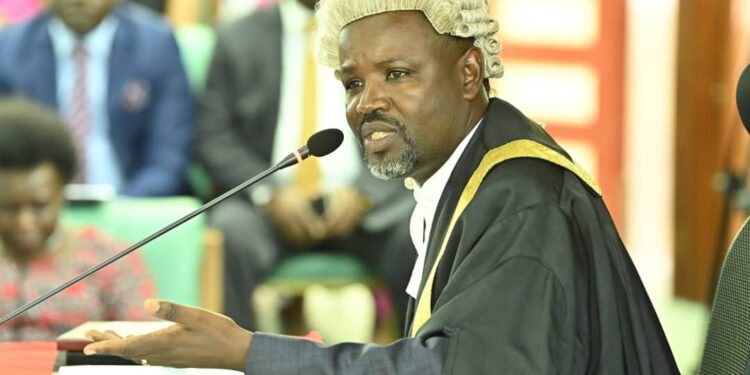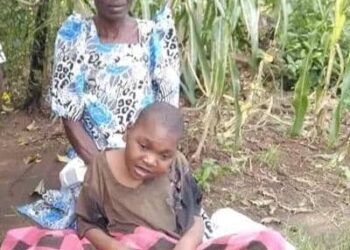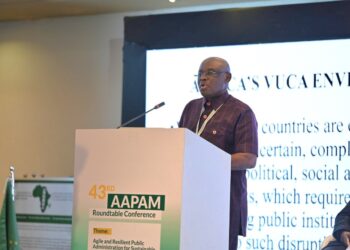Deputy Speaker of Parliament, Thomas Tayebwa, has tasked Parliament’s Agriculture Committee with investigating concerns raised by civil society organizations regarding the European Union’s new regulations on deforestation-free coffee imports.
These regulations, which require all coffee imported into EU member states to be grown on deforestation-free land, have raised alarm among Ugandan coffee farmers, many of whom are unclear about the compliance process.
Speaking during a parliamentary session on Tuesday, Tayebwa emphasized the importance of Parliament’s involvement in understanding the full scope of these regulations and their impact on Uganda’s coffee sector.
“I received a petition from the Civil Society on the European Union’s deforestation-free products regulations. I want to refer this petition to the Agriculture Committee so that we can appraise it, understand more, and see how best we can help our people comply with these critical regulations that will affect our sector,” Tayebwa remarked.
His call comes in response to widespread confusion among farmers about how to comply with the European Union Regulation on Deforestation-Free Products (EUDR) introduced in 2023. This legislation was enacted to prevent products linked to deforestation from entering the EU market as part of the bloc’s efforts to combat climate change and biodiversity loss.
However his call to the Parliamentary Agricultural Committee comes just three weeks prior, the Uganda Coffee Development Authority (UCDA) held a media briefing to clarify the importance of farmer registration in line with these EU requirements.
UCDA’s Director of Development Services, Gerald Kyalo, stressed that mandatory registration is key for Ugandan coffee farmers to maintain access to the lucrative European market, which accounts for over 60 percent of Uganda’s coffee exports.
Kyalo explained that the registration process is essential for ensuring traceability, a cornerstone of the new regulations. “The registration process is meant for traceability and making sure our coffee accesses the EU market,” Kyalo stated during the briefing held at Hotel Africana. He further elaborated that the UCDA will map farms using geographic coordinates to create a traceable system that proves Ugandan coffee is not linked to deforestation.
For many Ugandan farmers, this represents a significant change in how they conduct their business. Coffee farming has long been a tradition passed down through generations, often without formal documentation. Now, farmers will need to integrate into a comprehensive system that tracks every stage of coffee production, from cultivation to export.
Larger farms with ten acres or more will undergo detailed mapping to capture their geographic polygons, while smaller farms will be mapped with simpler coordinates. Kyalo emphasized that both large and small farms are crucial to the traceability network.
“We must be able to trace our coffee, and that is the bottom line. Traceability of coffee means we conduct farmer registration, but in reality, we will be capturing the geo-location of the farms and a few details of the farmer,” Kyalo noted.
As Uganda looks to comply with the stringent EU standards, ensuring traceability is critical. The regulations require proof that coffee exported to the EU is not contributing to deforestation. “We must show evidence that our coffee doesn’t contribute to deforestation. To do this, we need to trace our coffee back to the farmer, wherever they are,” Kyalo asserted.
This shift towards greater documentation and traceability is set to redefine Uganda’s coffee sector, as the country adapts to global standards in environmental protection and sustainable farming.
Sensitization Efforts Crucial
For the past three weeks, the Uganda Coffee Development Authority (UCDA) has been conducting sensitization campaigns with various coffee farmers and key stakeholders, including the Inter-Religious Council and traditional leaders like the Buganda Kingdom premier.
These efforts aim to promote widespread awareness and address misinformation surrounding the mandatory registration of coffee farmers while emphasizing the need to keep the issue free from political influence.
Deputy Speaker Tayebwa has called for more robust sensitization efforts to ensure farmers are fully aware of what is expected of them. While the Ministry of Agriculture has made strides in communicating the new requirements, Tayebwa underscored the need for Parliament to be more involved in guiding the sensitization process.
“A lot of confusion is going on; people don’t know where to start. The Ministry of Agriculture has tried, but I think we need to be brought on board fully so that we can participate in the sensitization process,” Tayebwa concluded.
As Uganda’s coffee industry faces this pivotal transition, the collaboration between Parliament, civil society, and coffee farmers will be crucial in maintaining access to the EU market and ensuring the sustainability of the country’s most valuable agricultural export.
Do you have a story in your community or an opinion to share with us: Email us at editorial@watchdoguganda.com













